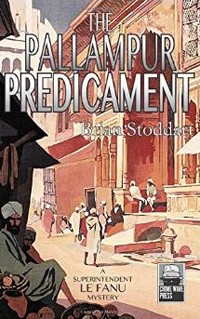Christian Le Fanu is a Superintendent with the Madras Police. Unlike many other junior army officers, he survived World War I, and in particular the savage battle against the Turks at Shaiba in 1915. There, Le Fanu commanded Indian soldiers and was inspired by their courage and loyalty, but saddened by having to lead some of them to their deaths. The Pellampur Predicament takes place in 1922, and with a failed marriage and a split with his parents behind him, Le Fanu carries out his police duties in an India where a burgeoning Congress Party, inspired by Mahatma Gandhi, is viewed with alarm by the British administration.
Le Fanu’s current case involves a landowner – the Rajah of Pallampur – and his dealings with two minor British officials. There are rumours of fraud and arms-smuggling. What seems a difficult but rather tedious case is blown wide open when La Fanu is woken by a telephone call informing him that the Rajah has been found hacked to death in his palace, in the Madras suburb of Kilpauk. Le Fanu and Sergeant Habibullah go to the crime scene to investigate.
Le Fanu is a keen student of the investigative principles of the Austrian criminologist Hans Gross. When he tries to protect the crime scene he has to fight off an aversion to blood he struggled against since the War. He survives his nausea to learn that the Rajah was killed with his own ceremonial sword, worn at a function earlier on the night he died. While casting around for motive and suspects, Le Fanu meets the late Rajah’s Australian wife, and is unprepared for the Rani’s lack of grief at her husband’s demise – and her blatant sexuality.
It seems that the Rani has been a collector of eligible men for some time, and was indulging one of her suitors on the evening of the Rajah’s death. Le Fanu is inclined to cross the Rani off his list of suspects, particularly when he discovers that the Rajah was in deep financial trouble and was involved with some serious criminals – including a Hong Kong-based human trafficking gang, and the IRA. Still, Le Fanu and Habi seem to be going around in circles. A fatal shoot-out between the police and some of the criminals brings more heat than light to the investigation, and it is not until Habibullah’s intuitive interview technique expands a tiny crack into a chasm that the Rajah’s killer is discovered.
The great twin joys of this book are the atmosphere and the characterisation. Le Fanu’s Madras is vividly brought to the page with the sounds, smells and tastes lingering long after the book is finished. The jittery state of the British administration is masterfully portrayed. The contrast between those who recognise the need for change and those who are getting their wagons into a circle couldn’t be clearer. You might even argue that the final unmasking of the Rajah’s killer is a little perfunctory and anti-climactic, but this is because we are so much more gripped by the relationships between Le Fanu and his beloved housekeeper Ro, between Le Fanu and his choleric boss Jepson, and between the various colonial officials who can almost smell upheaval on the breeze, but are divided on how to respond.
For a little more backstory, read our review of the first Superintendent Le Fanu book, A Madras Miasma.
Crime Wave Press
Print/Kindle
£4.59
CFL Rating: 5 Stars










